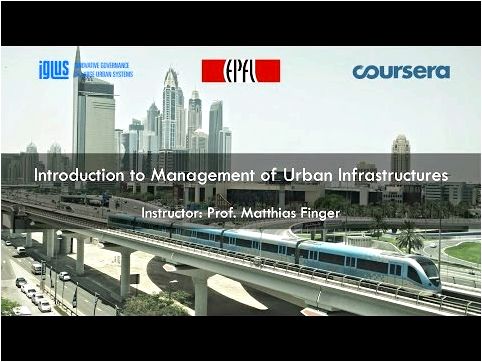
Abstract
Management of Urban Infrastructures is a Massive Open Online Course that offers an introduction to the principles of management of urban infrastructure systems. It addresses the main challenges that urban infrastructures are facing today, along with the corresponding management challenges that should be addressed in order to improve the performance of cities. The course is structured into 4 blocks. In the first two blocks, general principles of urban infrastructure management are covered. The last two blocks of the course focus on the management of urban energy and urban transportation systems as concrete cases.
Introduction and Learning Outcomes
Today, more than 3.9 billion people live in urban areas, that is, more than 54% of the global population. It is projected that urbanization will continue in the coming years, raising the urban population to 6.0 billion by 2045. This significant growth in urban populations will also increase the demand for energy, mobility, water, and other urban services in cities. The everyday lives of most of the human population now depend on how well these urban infrastructures function. Hence, cities have to become evermore efficient in the provision of urban services.
Moreover, cities are the biggest polluters of the environment and are responsible for more than 80% of Green House Gas emissions and 75% of waste generation; due to raising awareness of the negative environmental impacts of such pollution, cities have comeunder pressure to further improve their performance.
Increasing demands for sustainable, inclusive, reliable and efficient urban services puts a lot of pressure on urban infrastructures. In such a challenging situation, the proper management of urban infrastructures is essential to ensure that an expected quality of service will be delivered to the citizens. This course will provide you with the basic principles that must be considered to achieve thesuccessful management of urban infrastructure systems.
Learning Objectives
The purpose of this course is to cover the foundations of urban infrastructures management. By completing this course, the students will:
- Understand the main challenges that urban infrastructure systems are confronted with today;
- Become knowledgeable about how these issues translate into infrastructure management challenges;
- Learn about the main concepts and schools of thought in the management of urban infrastructure systems; and
- Apply such concepts and tools to the cases of urban energy and urban transportation systems.
The course offers a series of lectures that are delivered by different professors, as well as professionals with hands-on experience in the management of urban infrastructures. You will hear about many real-worldexamples through the course material and also from your peers in the course forums. Finally, at the end of the course you will put your new knowledge to test by writing your own case study about the management of a particular urban infrastructure in your home city.
Requirements and Evaluation
In order to obtain a certificate for this course, participants must pass all four graded quizzes, complete the mandatory assignments, and successfully complete a final exam. Participants will also have the possibility to write an optional 7-10 page case study about the management of an urban infrastructure system in their own cities. The case will be reviewed by our jury and authors of the 3 best papers will be granted a tuition waiver scholarship to enrolé in our professionalExecutive Training Programon the Innovative Governance of Large Urban Systems, starting in January 2017.
Structure of the course
The course is structured into four blocks of one-hour lectures. Each of the four blocks is subdivided into five, 12-minute, self-contained video lectures. At the end of the 5thlecture, you will have a reading that will provide you with a detailed summary of the main topics that were covered in that block and a relevant case study, and at the end of each block, you may also complete a graded quiz in order to assess your learnings throughout the section.
The blocks are structured as follows:
Block 1: Introduction to urban infrastructures
Block 2: Basic principles in the management of urban infrastructures
Block 3: Management of urban energy infrastructures
Block 4: Management of urban mobility infrastructures
In addition tofulfilling the mandatory requirements necessary to obtain the course certificate from Coursera, the participants can also write an optional case study and win a prize! The 3 best case studies will win a tuition waiver scholarship to enrol in the IGLUS professional training program, taking place Fall 2016.
Questions?
If you have any questions, please refer to the course forums first. We have an online Q&A forum where you can post and respond to questions from your peers. During the course, you will be supported by a team of TAs from EPFL, and our lecturers will periodically attend the forums to answer some of your most common questions directly. To take full advantage of the course, please also consider liking ourFacebook page, joining the Linked-In group and following us on Twitter.
Resourse:https://iglus.org/management-of-urban-infrastructures-mooc/ Key:Management of Urban Infrastructures MOOC